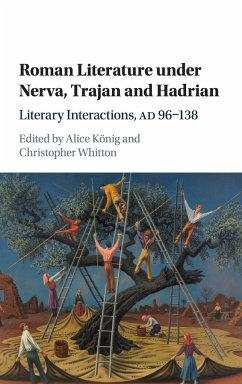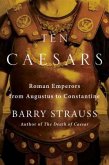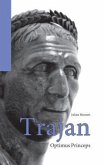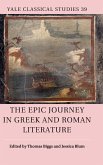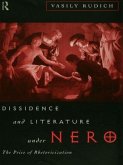Roman Literature under Nerva, Trajan and Hadrian
Herausgeber: König, Alice; Whitton, Christopher
Roman Literature under Nerva, Trajan and Hadrian
Herausgeber: König, Alice; Whitton, Christopher
- Gebundenes Buch
- Merkliste
- Auf die Merkliste
- Bewerten Bewerten
- Teilen
- Produkt teilen
- Produkterinnerung
- Produkterinnerung
The first holistic study of Roman literature and literary culture under Nerva, Trajan and Hadrian (AD 96-138).
Andere Kunden interessierten sich auch für
![Ten Caesars Ten Caesars]() Barry StraussTen Caesars20,99 €
Barry StraussTen Caesars20,99 €![Hadrian Hadrian]() Anthony R BirleyHadrian197,99 €
Anthony R BirleyHadrian197,99 €![Trajan Trajan]() Julian BennettTrajan197,99 €
Julian BennettTrajan197,99 €![The Epic Journey in Greek and Roman Literature The Epic Journey in Greek and Roman Literature]() The Epic Journey in Greek and Roman Literature124,99 €
The Epic Journey in Greek and Roman Literature124,99 €![Die Adoptivkaiser Die Adoptivkaiser]() Oliver SchippDie Adoptivkaiser22,00 €
Oliver SchippDie Adoptivkaiser22,00 €![History Of The People Of Israel: Period Of Jewish Independence And Judea Under Roman Rule. 1895 History Of The People Of Israel: Period Of Jewish Independence And Judea Under Roman Rule. 1895]() Ernest RenanHistory Of The People Of Israel: Period Of Jewish Independence And Judea Under Roman Rule. 189542,99 €
Ernest RenanHistory Of The People Of Israel: Period Of Jewish Independence And Judea Under Roman Rule. 189542,99 €![Dissidence and Literature Under Nero Dissidence and Literature Under Nero]() Vasily RudichDissidence and Literature Under Nero133,99 €
Vasily RudichDissidence and Literature Under Nero133,99 €-
-
-
The first holistic study of Roman literature and literary culture under Nerva, Trajan and Hadrian (AD 96-138).
Hinweis: Dieser Artikel kann nur an eine deutsche Lieferadresse ausgeliefert werden.
Hinweis: Dieser Artikel kann nur an eine deutsche Lieferadresse ausgeliefert werden.
Produktdetails
- Produktdetails
- Verlag: Cambridge University Press
- Seitenzahl: 490
- Erscheinungstermin: 16. November 2018
- Englisch
- Abmessung: 235mm x 157mm x 31mm
- Gewicht: 854g
- ISBN-13: 9781108420594
- ISBN-10: 1108420591
- Artikelnr.: 48860023
- Herstellerkennzeichnung
- Libri GmbH
- Europaallee 1
- 36244 Bad Hersfeld
- gpsr@libri.de
- Verlag: Cambridge University Press
- Seitenzahl: 490
- Erscheinungstermin: 16. November 2018
- Englisch
- Abmessung: 235mm x 157mm x 31mm
- Gewicht: 854g
- ISBN-13: 9781108420594
- ISBN-10: 1108420591
- Artikelnr.: 48860023
- Herstellerkennzeichnung
- Libri GmbH
- Europaallee 1
- 36244 Bad Hersfeld
- gpsr@libri.de
Part I. Bridging Divides: Literary Interactions from Quintilian to Juvenal:
1. Quintilian, Pliny, Tacitus Christopher Whitton; 2. I will survive (you):
Martial and Tacitus on regime change Victoria Rimell; 3. Flavian epic and
Trajanic historiography: speaking into the silence Emma Buckley; 4. Pliny
and Martial: dupes and non-dupes in the early Empire William Fitzgerald; 5.
Paradoxography and marvels in post-Domitianic literature: 'an extraordinary
affair, even in the hearing!' Rhiannon Ash; 6. Pliny and Suetonius on
giving and returning imperial power Paul Roche; 7. From Martial to Juvenal
(Epigrams 12.18) Gavin Kelly; Part II. Interactions On and Off the Page: 8.
Amicable and hostile exchange in the culture of recitation Matthew Roller;
9. Images of Domitius Apollinaris in Pliny and Martial: intertextual
discourses as aspects of self-definition and differentiation Sigrid
Mratschek; 10. Reading Frontinus in Martial's Epigrams Alice König; 11.
Saturninus the helmsman, Pliny and friends: legal and literary letter
collections Jill Harries; 12. Pliny Epistles 10 and imperial
correspondence: the empire of letters Myles Lavan; 13. Traditional exempla
and Nerva's new modernity: making Fabricius take the cash Ruth Morello; 14.
Extratextuality: literary interactions with oral culture and exemplary
ethics Rebecca Langlands; Part III. Into the Silence: The Limits of
Interaction: 15. The Regulus connection: displacing Lucan between Martial
and Pliny Ilaria Marchesi; 16. Forgetting the Juvenalien in our midst:
literary amnesia in the Satires Tom Geue; 17. Childhood education and the
boundaries of interaction: [Plutarch], Quintilian, Juvenal James Uden; 18.
Pliny and Plutarch's practical ethics: a newly rediscovered dialogue Roy K.
Gibson; ENVOI/VENIO John Henderson.
1. Quintilian, Pliny, Tacitus Christopher Whitton; 2. I will survive (you):
Martial and Tacitus on regime change Victoria Rimell; 3. Flavian epic and
Trajanic historiography: speaking into the silence Emma Buckley; 4. Pliny
and Martial: dupes and non-dupes in the early Empire William Fitzgerald; 5.
Paradoxography and marvels in post-Domitianic literature: 'an extraordinary
affair, even in the hearing!' Rhiannon Ash; 6. Pliny and Suetonius on
giving and returning imperial power Paul Roche; 7. From Martial to Juvenal
(Epigrams 12.18) Gavin Kelly; Part II. Interactions On and Off the Page: 8.
Amicable and hostile exchange in the culture of recitation Matthew Roller;
9. Images of Domitius Apollinaris in Pliny and Martial: intertextual
discourses as aspects of self-definition and differentiation Sigrid
Mratschek; 10. Reading Frontinus in Martial's Epigrams Alice König; 11.
Saturninus the helmsman, Pliny and friends: legal and literary letter
collections Jill Harries; 12. Pliny Epistles 10 and imperial
correspondence: the empire of letters Myles Lavan; 13. Traditional exempla
and Nerva's new modernity: making Fabricius take the cash Ruth Morello; 14.
Extratextuality: literary interactions with oral culture and exemplary
ethics Rebecca Langlands; Part III. Into the Silence: The Limits of
Interaction: 15. The Regulus connection: displacing Lucan between Martial
and Pliny Ilaria Marchesi; 16. Forgetting the Juvenalien in our midst:
literary amnesia in the Satires Tom Geue; 17. Childhood education and the
boundaries of interaction: [Plutarch], Quintilian, Juvenal James Uden; 18.
Pliny and Plutarch's practical ethics: a newly rediscovered dialogue Roy K.
Gibson; ENVOI/VENIO John Henderson.
Part I. Bridging Divides: Literary Interactions from Quintilian to Juvenal:
1. Quintilian, Pliny, Tacitus Christopher Whitton; 2. I will survive (you):
Martial and Tacitus on regime change Victoria Rimell; 3. Flavian epic and
Trajanic historiography: speaking into the silence Emma Buckley; 4. Pliny
and Martial: dupes and non-dupes in the early Empire William Fitzgerald; 5.
Paradoxography and marvels in post-Domitianic literature: 'an extraordinary
affair, even in the hearing!' Rhiannon Ash; 6. Pliny and Suetonius on
giving and returning imperial power Paul Roche; 7. From Martial to Juvenal
(Epigrams 12.18) Gavin Kelly; Part II. Interactions On and Off the Page: 8.
Amicable and hostile exchange in the culture of recitation Matthew Roller;
9. Images of Domitius Apollinaris in Pliny and Martial: intertextual
discourses as aspects of self-definition and differentiation Sigrid
Mratschek; 10. Reading Frontinus in Martial's Epigrams Alice König; 11.
Saturninus the helmsman, Pliny and friends: legal and literary letter
collections Jill Harries; 12. Pliny Epistles 10 and imperial
correspondence: the empire of letters Myles Lavan; 13. Traditional exempla
and Nerva's new modernity: making Fabricius take the cash Ruth Morello; 14.
Extratextuality: literary interactions with oral culture and exemplary
ethics Rebecca Langlands; Part III. Into the Silence: The Limits of
Interaction: 15. The Regulus connection: displacing Lucan between Martial
and Pliny Ilaria Marchesi; 16. Forgetting the Juvenalien in our midst:
literary amnesia in the Satires Tom Geue; 17. Childhood education and the
boundaries of interaction: [Plutarch], Quintilian, Juvenal James Uden; 18.
Pliny and Plutarch's practical ethics: a newly rediscovered dialogue Roy K.
Gibson; ENVOI/VENIO John Henderson.
1. Quintilian, Pliny, Tacitus Christopher Whitton; 2. I will survive (you):
Martial and Tacitus on regime change Victoria Rimell; 3. Flavian epic and
Trajanic historiography: speaking into the silence Emma Buckley; 4. Pliny
and Martial: dupes and non-dupes in the early Empire William Fitzgerald; 5.
Paradoxography and marvels in post-Domitianic literature: 'an extraordinary
affair, even in the hearing!' Rhiannon Ash; 6. Pliny and Suetonius on
giving and returning imperial power Paul Roche; 7. From Martial to Juvenal
(Epigrams 12.18) Gavin Kelly; Part II. Interactions On and Off the Page: 8.
Amicable and hostile exchange in the culture of recitation Matthew Roller;
9. Images of Domitius Apollinaris in Pliny and Martial: intertextual
discourses as aspects of self-definition and differentiation Sigrid
Mratschek; 10. Reading Frontinus in Martial's Epigrams Alice König; 11.
Saturninus the helmsman, Pliny and friends: legal and literary letter
collections Jill Harries; 12. Pliny Epistles 10 and imperial
correspondence: the empire of letters Myles Lavan; 13. Traditional exempla
and Nerva's new modernity: making Fabricius take the cash Ruth Morello; 14.
Extratextuality: literary interactions with oral culture and exemplary
ethics Rebecca Langlands; Part III. Into the Silence: The Limits of
Interaction: 15. The Regulus connection: displacing Lucan between Martial
and Pliny Ilaria Marchesi; 16. Forgetting the Juvenalien in our midst:
literary amnesia in the Satires Tom Geue; 17. Childhood education and the
boundaries of interaction: [Plutarch], Quintilian, Juvenal James Uden; 18.
Pliny and Plutarch's practical ethics: a newly rediscovered dialogue Roy K.
Gibson; ENVOI/VENIO John Henderson.

